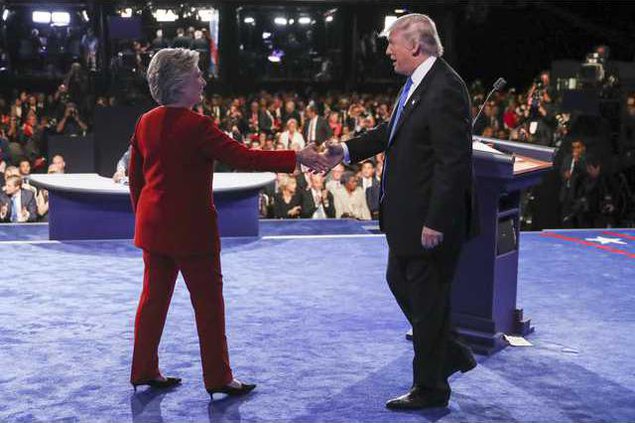Hillary Clinton and Donald Trump faced off in their first presidential election debate on Monday night. The two candidates focused the contest on issues such as taxes, the economy and other financial matters plaguing Americans.
In addition, the two candidates also traded personal jabs, with Clinton digging at Trumps history as a businessman, his history with birtherism (the idea that President Obama wasnt born in the United States) and his decision not to share his tax returns. Trump slammed Clinton's history with her private email servers and her inability to connect with the American public.
So who won? An early CNN/ORC poll taken on debate night found voters felt Clinton was victorious over Trump, 62 to 27 percent. MSNBC political correspondent Steve Kornacki noted that this gap is larger than from debates dating back to 1984, save for Mitt Romneys dominant victory over Obama in 2012. As Vox reported, polls from Public Policy polling, as well as focus groups from Florida and Pennsylvania, also said Clinton claimed the victory.
Pundits similarly said this morning that Clinton won the debate, according to The New York Times. Even during Trumps supposed best moment, Clinton surged among undecided voters, as seen in this graphic provided by commentator Frank Luntz.
But one quick scroll through Twitter would show something different than whats being reported in the mainstream media. On Tuesday morning, the top phrase trending across the United States was the simple hashtag, #TrumpWon.
Trump supporters and conservative pundits were out in full force, charging that the GOP nominees soundbites from the debate gave him the edge. Others pointed to the early morning snap polls (often filled out by social media users and online web readers) and data from Monday night that show Trump gaining an edge over Clinton.
But other people on social media, especially those who supported Clinton and felt she won, began to wonder if #TrumpWon was a hoax, and if they had watched the same debate as others.
These supporters then turned the #TrumpWon hashtag into a mockery.
But the fact remains that Trump did win, at least in terms of Twitter discussion. According to The Hill, Trump made up 62 percent of the conversation on Twitter Monday night, which includes both criticism and praise for the Republican nominee. Conversely, Clinton earned 38 percent of the tweets. The data came from Twitter Government, a Twitter account created for the election.
Trump also dominated the Facebook conversation, becoming the subject of 79 percent of the debate. Clinton, meanwhile, earned 21 percent of the conversation, according to The Hill.
Though Trump won on Twitter and Facebook, it should be noted that Clintons name was searched more than any other by all 50 states during the debate, according to Google Trends.
As this visual shows, Clintons name overtook Trumps in terms of search terms while the debate rolled on.
In addition, the two candidates also traded personal jabs, with Clinton digging at Trumps history as a businessman, his history with birtherism (the idea that President Obama wasnt born in the United States) and his decision not to share his tax returns. Trump slammed Clinton's history with her private email servers and her inability to connect with the American public.
So who won? An early CNN/ORC poll taken on debate night found voters felt Clinton was victorious over Trump, 62 to 27 percent. MSNBC political correspondent Steve Kornacki noted that this gap is larger than from debates dating back to 1984, save for Mitt Romneys dominant victory over Obama in 2012. As Vox reported, polls from Public Policy polling, as well as focus groups from Florida and Pennsylvania, also said Clinton claimed the victory.
Pundits similarly said this morning that Clinton won the debate, according to The New York Times. Even during Trumps supposed best moment, Clinton surged among undecided voters, as seen in this graphic provided by commentator Frank Luntz.
But one quick scroll through Twitter would show something different than whats being reported in the mainstream media. On Tuesday morning, the top phrase trending across the United States was the simple hashtag, #TrumpWon.
Trump supporters and conservative pundits were out in full force, charging that the GOP nominees soundbites from the debate gave him the edge. Others pointed to the early morning snap polls (often filled out by social media users and online web readers) and data from Monday night that show Trump gaining an edge over Clinton.
But other people on social media, especially those who supported Clinton and felt she won, began to wonder if #TrumpWon was a hoax, and if they had watched the same debate as others.
These supporters then turned the #TrumpWon hashtag into a mockery.
But the fact remains that Trump did win, at least in terms of Twitter discussion. According to The Hill, Trump made up 62 percent of the conversation on Twitter Monday night, which includes both criticism and praise for the Republican nominee. Conversely, Clinton earned 38 percent of the tweets. The data came from Twitter Government, a Twitter account created for the election.
Trump also dominated the Facebook conversation, becoming the subject of 79 percent of the debate. Clinton, meanwhile, earned 21 percent of the conversation, according to The Hill.
Though Trump won on Twitter and Facebook, it should be noted that Clintons name was searched more than any other by all 50 states during the debate, according to Google Trends.
As this visual shows, Clintons name overtook Trumps in terms of search terms while the debate rolled on.



